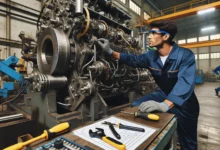Industrial Insurance Essentials
Advertisement
Introduction
Industrial insurance is a vital component of any business’s risk management strategy. It provides protection against unforeseen events that could lead to financial losses, such as property damage, liability claims, or business interruption. In this article, we will delve into the essential aspects of industrial insurance, its strengths and weaknesses, and why it is crucial for your business’s success.
Whether you are a small business owner or a large corporation, having the right industrial insurance coverage can make all the difference in times of crisis. It not only protects your assets but also gives you peace of mind knowing that you are prepared for any eventuality.
With the ever-changing business landscape and the increasing risks associated with running a business, industrial insurance is more important than ever. By understanding its essentials, you can make informed decisions that will benefit your business in the long run.
From property damage to employee injuries, industrial insurance provides coverage for a wide range of risks that businesses face on a daily basis. By having the right policies in place, you can protect your business from potential financial ruin and ensure its continued success.
As the saying goes, “it’s better to be safe than sorry.” Industrial insurance is a proactive approach to managing risks and safeguarding your business’s future. By investing in the right insurance coverage, you can focus on growing your business with confidence, knowing that you are protected against unforeseen events.
Now, let’s explore the strengths and weaknesses of industrial insurance essentials in more detail to help you make an informed decision for your business.
Strengths of Industrial Insurance Essentials
1. Financial Protection
Industrial insurance provides financial protection to businesses by covering the costs associated with property damage, liability claims, and other unforeseen events. This can prevent significant financial losses that could otherwise cripple a business.
2. Legal Compliance
Having the right industrial insurance coverage ensures that your business complies with legal requirements in your industry. This can help avoid costly penalties and potential lawsuits that may arise from non-compliance.
3. Peace of Mind
Knowing that your business is protected by industrial insurance can give you peace of mind and allow you to focus on running your business without constantly worrying about potential risks.
4. Tailored Coverage
Industrial insurance policies can be tailored to suit the specific needs of your business, ensuring that you have the right level of coverage for your unique risks and circumstances.
5. Business Continuity
In the event of a crisis, industrial insurance can help your business stay afloat by covering the costs of repairs, replacements, and other expenses, allowing you to continue operating without major disruptions.
6. Risk Management
Industrial insurance is an essential tool for managing risks and protecting your business from unforeseen events that could jeopardize its operations. By identifying potential risks and securing the right coverage, you can mitigate the impact of unexpected events on your business.
7. Competitive Advantage
Having robust industrial insurance coverage can give your business a competitive advantage by instilling trust and confidence in your customers, suppliers, and other stakeholders. It demonstrates that you are a reliable and responsible business that takes risk management seriously.
Weaknesses of Industrial Insurance Essentials
1. Cost
One of the main drawbacks of industrial insurance is the cost associated with purchasing and maintaining coverage. Depending on the level of coverage and the risks involved, premiums can be a significant expense for businesses, especially for small enterprises with limited budgets.
2. Coverage Gaps
Despite having industrial insurance coverage, there may be gaps in protection that could leave your business vulnerable to certain risks. It is important to carefully review your policies and ensure that they cover all potential scenarios that could impact your business.
3. Complex Claims Process
When filing a claim with your industrial insurance provider, the process can be complex and time-consuming, especially for more significant claims. This can add stress and frustration to an already challenging situation, potentially delaying the resolution of the issue.
4. Changing Risks
The business landscape is constantly evolving, with new risks emerging all the time. Industrial insurance may not always keep pace with these changes, leaving your business exposed to unforeseen threats that are not covered by your existing policies.
5. Overlapping Coverage
Having multiple industrial insurance policies can lead to overlapping coverage, where certain risks are covered by more than one policy. This can result in unnecessary costs and confusion when it comes to filing claims and managing your coverage.
6. Limited Coverage Options
Not all risks may be covered by industrial insurance, depending on the type of policy you have. Some risks may require additional coverage or alternative risk management strategies to fully protect your business against all potential threats.
7. Reputation Risk
In some cases, relying too heavily on industrial insurance to manage risks can create a reputational risk for your business. Customers and stakeholders may view your business as high-risk or unreliable if they perceive that you are overly dependent on insurance to mitigate potential threats.
Industrial Insurance Essentials Table
| Aspect | Description | Importance |
|---|---|---|
| Financial Protection | Covers costs of property damage and liability claims | High |
| Legal Compliance | Ensures compliance with industry regulations | High |
| Peace of Mind | Provides assurance against unforeseen risks | High |
| Tailored Coverage | Customized policies for unique business needs | High |
| Business Continuity | Helps maintain operations during crises | High |
| Risk Management | Identifies and mitigates potential risks | High |
| Competitive Advantage | Enhances trust and confidence with stakeholders | High |
Frequently Asked Questions about Industrial Insurance
1. What factors should I consider when choosing industrial insurance coverage?
When selecting industrial insurance coverage, it is essential to consider your business’s unique risks, industry regulations, budget limitations, and coverage needs. Working closely with an experienced insurance agent can help you navigate the complexities of industrial insurance and make informed decisions.
2. How can I reduce the cost of industrial insurance premiums for my business?
There are several strategies you can use to lower the cost of industrial insurance premiums, such as implementing risk management practices, bundling policies, increasing deductibles, and shopping around for competitive quotes from different insurers.
3. What types of risks are typically covered by industrial insurance policies?
Industrial insurance policies commonly cover risks such as property damage, liability claims, business interruption, employee injuries, product liability, cyber attacks, and natural disasters. It is essential to review your policies carefully to ensure that all relevant risks are adequately covered.
4. How do I know if my business needs industrial insurance coverage?
If your business owns property, employs workers, interacts with customers, or faces potential liability claims, industrial insurance coverage is crucial to protect your assets and operations. Consulting with an insurance professional can help you assess your risk exposure and determine the appropriate coverage for your business.
5. Can industrial insurance help my business recover from a disaster?
Industrial insurance can play a significant role in helping your business recover from a disaster by providing financial assistance for repairs, replacements, and other expenses incurred as a result of the event. Having the right coverage in place can expedite the recovery process and minimize disruptions to your operations.
6. What are the consequences of not having industrial insurance for my business?
Without industrial insurance coverage, your business may be vulnerable to significant financial losses, legal liabilities, reputational damage, and operational disruptions in the event of unforeseen events. It is essential to protect your business with adequate insurance coverage to mitigate these risks and ensure its long-term viability.
7. How often should I review my industrial insurance policies?
It is recommended to review your industrial insurance policies annually or whenever significant changes occur in your business, such as expansion, acquisitions, new projects, or regulatory updates. Regularly assessing your coverage ensures that you are adequately protected against evolving risks and uncertainties.
Conclusion
In conclusion, industrial insurance essentials are a crucial component of any business’s risk management strategy. By understanding the strengths and weaknesses of industrial insurance, as well as the importance of tailored coverage and proactive risk management, you can safeguard your business against unforeseen events and ensure its continued success.
Take action today to review your industrial insurance coverage, address any gaps in protection, and strengthen your risk management practices to protect your business’s future. Investing in industrial insurance is an investment in your business’s stability, resilience, and long-term growth.
Don’t wait until it’s too late. Protect your business with industrial insurance essentials and enjoy the peace of mind that comes with knowing you are prepared for whatever the future may bring.
Remember, it’s better to be safe than sorry. Industrial insurance is your best defense against the uncertainties and risks of running a business. Take control of your business’s future today and ensure its success for years to come.
Disclaimer
The information provided in this article is for general informational purposes only and should not be construed as legal, financial, or insurance advice. It is recommended to consult with a licensed insurance professional or legal advisor to assess your specific business needs and determine the appropriate industrial insurance coverage for your business.









